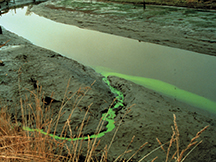 Septic systems are designed to have a lifespan of 20 to 30 years, although many last longer. The most common cause of early failure is improper maintenance. A well maintained system is one that is inspected at the recommended frequency and maintained as necessary. A system that is not pumped when needed will result in a build-up of sludge and floating solids, such as greases and toilet paper, inside the septic tank. If these build up too much they will flow out of the tank into the drain field, causing it to become clogged beyond repair. Other causes of failure can include pipes blocked by roots, crushed pipes, over-saturation of the soils, flushing of inappropriate items (like cigarette butts), poor design, or poor installation.
Septic systems are designed to have a lifespan of 20 to 30 years, although many last longer. The most common cause of early failure is improper maintenance. A well maintained system is one that is inspected at the recommended frequency and maintained as necessary. A system that is not pumped when needed will result in a build-up of sludge and floating solids, such as greases and toilet paper, inside the septic tank. If these build up too much they will flow out of the tank into the drain field, causing it to become clogged beyond repair. Other causes of failure can include pipes blocked by roots, crushed pipes, over-saturation of the soils, flushing of inappropriate items (like cigarette butts), poor design, or poor installation.
YOU KNOW YOU HAVE A SERIOUS PROBLEM IF YOU EXPERIENCE ANY OF THE FOLLOWING
- Sewage backing up in your toilets, sinks, or bathtubs.
- Slow flushing toilets, as well as drains that are draining much slower, even after using plungers or “plumbers’ snakes.”
- Water pooling in your yard or accumulating near your septic tank. This water may or may not be accompanied by a foul odor.
- Black or dark grey stains in soil or grasses on the drainfield or surrounding areas.
- Overly moist or mushy areas in your drainfield area.
- Algae growth on subsurface drainage pipe outlets, bulkheads, or visible seeps on the beach or along the stream.
If your septic system appears to be failing:
- Avoid using septic system “miracle cures” that promise to get rid of the sludge and scum in your system. “Miracle cures” may dissolve the sludge and scum, sending dissolved particles into your drainfield, potentially clogging the soils in the drainfield and requiring expensive drainfield repair or replacement.
- Contact your local health department or surface water agency to find out if their staff may be able to assess your situation and give you advice on how to solve the problem. Your local conservation district may also be helpful. These organizations may also be able to connect you with special loan programs for repairing your system.
- Fence off areas if there is liquid waste seeping to the surface of your yard so that pets and people, especially children, are not in contact with the liquid.
- Conserve water as described in Guideline 8. This can extend the life of your system if it turns out it has not failed completely.
- Have your system pumped and filters cleaned, combined with some drastic water conservation around the home, may help solve the problem temporarily, as an empty tank can hold up to several days of waste.
Ways to save money
Maintaining and repairing your septic system can be expensive. Because of the importance of maintaining your system to public health, there are sometimes coupons, classes, incentives, and low-interest loans available. Check with your health department, surface water agency, or conservation district to see if they have any incentives.